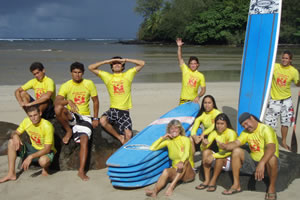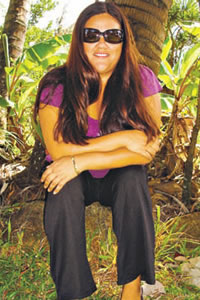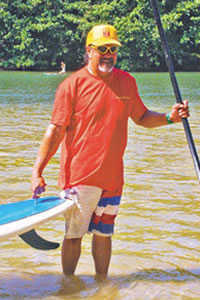Work Is A Day At The Beach

The Hawaiian Surfing Adventures instructors know the bay well because they surf it. Photo courtesy Kanani Alapa
Owners, Hawaiian Surfing Adventures
Please tell us about your business.
Kanani: Hawaiian Surfing Adventures is a familyowned, family-operated business that’s a little bit of Hawaiian and a lot of love for Hanalei. My dad Mitchell K. and I own the business with my mother Lynn, brother Mitchell P. and sister Bridget Tampus. We teach stand-up paddleboarding, surfing and rent surfboards and Boogie boards. The classes are two hours and we go where the best surf spot is for the day at Hanalei Bay. All the instructors have been raised on this island and a lot of them grew up in the surf circuit. They are lifeguard trained and CPR certified. They also recently did their Red Cross Ocean Safety courses.
How did you get started in this business?
Mitchell: We’ve been in business 12 years, but ever since I learned how to surf, I’ve been teaching people. I was the only kid who grew up on the island who had a TV. The first movie I saw on TV was Gidget. They were on Malibu Beach and I thought, “That’s what I want to do; I want to be on the beach.” As I grew up, I also saw all the beach boys at Waikiki and I said I wanted to be just like them. At the age of 13, it was the first time I got to do a lesson. I started at Black Pot Beach Park with four surfboards. Now we have about 200 and about 10 instructors.
Why do you do what you do?
Kanani: I’m really big into cultural practice and I don’t want to have to be a slave to the hotel industry. Doing this, I’m with my family; we work together. We’re able to stay connected to the land and the water. And dad just loves the water; you can’t get him away. If he didn’t do surfing as a business, then he probably wouldn’t work because he’d just be at the beach all the time.
Are people more interested in learning how to surf or stand-up paddleboarding?Kanani: It’s still surfing.
But in recent years, paddleboarding has definitely upped the industry, so to speak, because people can do it on lakes and rivers, so people from even the Midwest are familiar with it.
What sets your business apart from others?
Kanani: The biggest thing for us is safety.
Safety takes precedence over anything. We take the most time, whether it’s a lesson or renting. We explain things very thoroughly so that we don’t have to worry about risking injury or people getting blown out.
What should people know about the ocean?
Kanani: You have to respect it. Never turn your back, and always ask the locals in whatever region you’re entering what the conditions are, or speak to lifeguards.
What’s the most challenging aspect of your business?
Kanani: The protesters and the lack of surf permits. The boat controversy, which has been a 40-year battle, has transitioned into all water activities. Twelve years ago there were only four main surfing schools and we were one of them. Now there are about 35. So they’re trying to regulate it, but now the rules are so limiting, we don’t even know how we’ll survive.What is the most rewarding aspect of your business?
Mitchell: Seeing the people that I’ve taught come back to me for years and years and years. I’ve watched kids grow up, go to college and come back with their own kids now.
Kanani: For me, it’s sharing culture. There is ritual involved with surfing and a lot of people don’t know that because it’s seen in modern times as a sport instead of an integral part of cultural activity and religion.
Did surfing start in Hawaii?
Kanani: The world recognizes Hawaii as the birthplace of modern-day surfing. Peruvians would argue with you because they also surf, but they surf bamboo reef canoe-style boards, they don’t actually have the type of board that we think of today.
If you weren’t doing this, what would you be doing?
Kanani: Writing and dancing hula.
Mitchell: I’d be down at the beach talking to the tourists all day.





